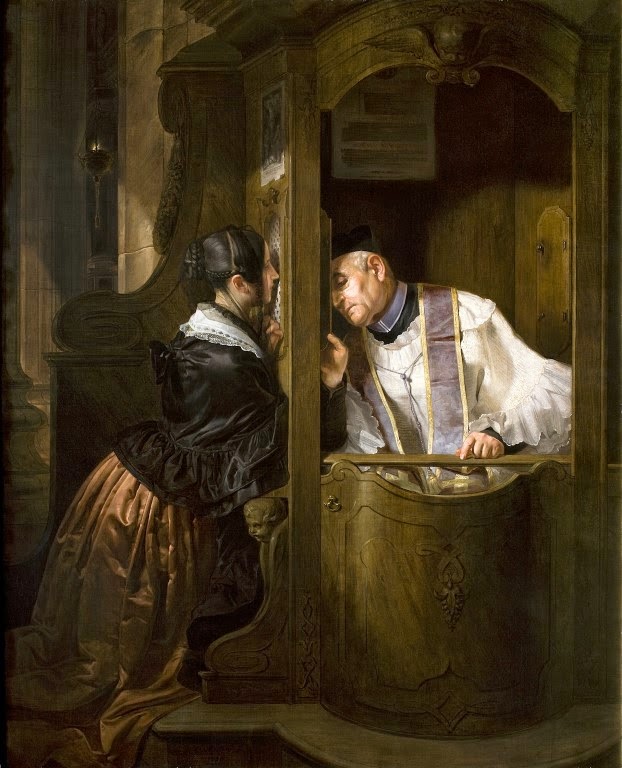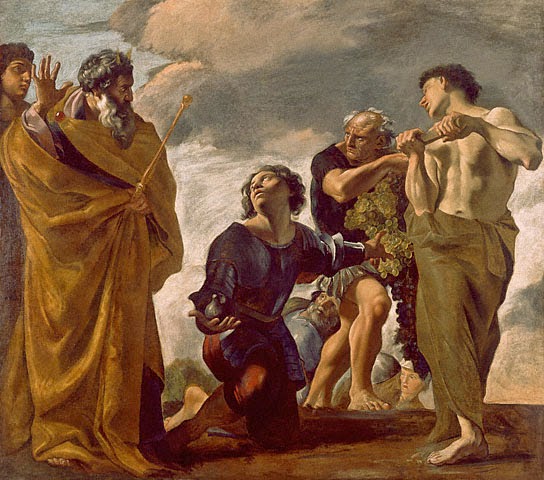Before entering the Promised Land, Moses sent twelve men to scout out the area. When they returned, they announced that the land was just as God had promised, but that it was occupied by some fierce warriors living in fortified cities (Numbers 13:25-29):
Giovanni Lanfranco (1582–1647), Moses and the Messengers from Canaan (1624) At the end of forty days they returned from spying out the land. And they came to Moses and Aaron and to all the congregation of the people of Israel in the wilderness of Paran, at Kadesh; they brought back word to them and to all the congregation, and showed them the fruit of the land. And they told him, “We came to the land to which you sent us; it flows with milk and honey, and this is its fruit. Yet the people who dwell in the land are strong, and the cities are fortified and very large; and besides, we saw the descendants of Anak there. The Amal′ekites dwell in the land of the Negeb; the Hittites, the Jeb′usites, and the Amorites dwell in the hill country; and the Canaanites dwell by the sea, and along the Jordan.”
So there’s an obstacle to receiving the land that God promised. The people, hearing this, quickly blow it out of proportion. While Caleb, one of the twelve spies, tries to talk some sense into them, most of the other spies just fuel their fears by telling exaggerated accounts of what they witnessed (Num. 13:30-33):
But Caleb quieted the people before Moses, and said, “Let us go up at once, and occupy it; for we are well able to overcome it.” Then the men who had gone up with him said, “We are not able to go up against the people; for they are stronger than we.” So they brought to the people of Israel an evil report of the land which they had spied out, saying, “The land, through which we have gone to spy it out, is a land that devours its inhabitants; and all the people that we saw in it are men of great stature. And there we saw the Nephilim (the sons of Anak, who come from the Nephilim); and we seemed to ourselves like grasshoppers, and so we seemed to them.”
Somehow, all of those giants and man-eating lands were left out of the initial report. In the end, the people despair of God’s promise, saying: “Would that we had died in the land of Egypt! Or would that we had died in this wilderness! Why does the Lord bring us into this land, to fall by the sword? Our wives and our little ones will become a prey; would it not be better for us to go back to Egypt?” (Num. 14:2-3). They decide to choose their own leader and march back to Egypt, willing to go back into slavery to avoid confronting their fears (Num. 14:4). As a result, most of that generation never made it to the Promised Land.
Are we so different?
It seems to me that all of us have these sort of fears: we know that we’re supposed to do something, but we’re dreading it for some reason. If we’re not careful, this obstacle gets bigger and bigger in our minds until it seems like an unbeatable giant. The voice inside, telling us to trust God, and that we will be able to overcome these obstacles risks getting drowned out by the voice telling us that we can’t, that our problems are stronger than we are. That’s the voice of discouragement and despair, and it never comes from God. We worship “the God of hope” (Romans 15:13), and the devil seeks to undermine this hope by preying upon our fears.
There’s one land in particular in which these giants run amok: sin. Before we sin, the devil tries to convince us that it’s not a big deal. Afterwards, he tries to convince us that the sin is so big that God could never forgive us, so we might as well give up. He’ll then use this as an excuse to get you to sin more: since you’re already a lost cause, you might as well have some fun, right? Since we can’t beat our giants, why not resign ourselves to Egypt, the place of slavery, where we can at least have some pleasure?
All of these are demonic distortions: we need to be careful to avoid sin, and not to rationalize it; but we also need to be careful to remember that the God of Mercy is infinitely bigger than our sin. It’s an insult to God’s majesty to suggest that we have a debt so large He can’t pay it, just as it was an insult to God for the Israelites to suggest that the Promised Land might be occupied by soldiers too big and strong for God to defeat.
If you find yourself battling these giants, run, don’t walk, to the nearest confessional. If your embarrassment or shame at your sin is keeping you from going to confession, don’t let it. That’s like avoiding going to the doctor because you’re embarrassed at how sick you are. Here are four things that you should know:
 |
| Giuseppe Molteni, The Confession (1838) |
- He’s probably heard it all before. Particularly if you’re dealing with a priest that’s been around for a while, chances are, you’re not going to tell him anything new. There are only so many sins in the world. Embarrassed about some sexual sin you’re facing, like masturbation, pornography, adultery, or fornication? You’re not the first to struggle with these sins. Same goes for sins like abortion, theft, even murder. Some priests hear confessions at the local prisons, so you’re going to have a hard time shocking the priest by some new sin. (That voice telling you that your sins are the worst sins ever committed isn’t coming from God).
- He’s happy that you’re there. I had dinner with a priest recently who recounted the first time that a woman came to him to confess having had an abortion (because of the confessional seal, he kept this vague). The woman who had gone to him hadn’t been to confession in longer than this priest had been alive. He was visibly moved in recounting the way that God chose him to bring mercy to this woman, who had been struggling for decades in private. Men become priests to be instruments of the mercy of God. When you go to confession, you’re letting the priest be a priest.
- The priest’s reaction doesn’t really matter. Let’s say that I’m wrong, and you find a priest who is shocked or scandalized. Does it matter? In exchange for a few moments of embarrassment, you get reconciliation with the Most High God, and liberation from all your sins. Christ thought liberating you from your sins was worth going to the Cross. Do you not think it’s worth a little awkwardness?
- Sin is easy to fix. The Sacrament really does liberate you from your sins. It’s worth remembering that the Israelites had built up these giants in their mind. In real life, they weren’t so bad. Remember Caleb, the spy who kept his head and didn’t give in to his fears? God rewarded him with a portion of the Promised Land… a portion occupied by the sons of Anak that everybody else was so worried about. Here’s how Joshua 15:14 describes Caleb taking the land: “And Caleb drove out from there the three sons of Anak, She′shai and Ahi′man and Talmai, the descendants of Anak.” That’s it? It doesn’t sound even sound like it was hard for him. The fear of the sons of Anak was totally overblown.


JOE. Brilliant as always. Thank you for helping me to combat some funny demons. I will be off to the Sacrament of Confession as soon as possible.
God love you.
Sean,
Thrilled to hear it. God bless!
Joe
It’s the lucky diocese that will call you Father, Joseph!
That’s my Archdiocese, hurray!
This is a great post, especially, “letting the priest be a priest” as stated in point #2. That’s an angle easy for us to forget, I think.
Wow. Your post just slapped me in the conscience and I thank you for it. The spies’ sin was fixing their focus on the obstacle resulting in excessive fear instead of focusing on God and trusting His promises. There is my #1 sin in a nutshell. God just brought me this far into the desert to die. Sounds so ugly when I say it out loud. It is my experience with Confession that articulating something makes me both face the sin which defeats rationalization and encountering the overwhelming Mercy which brings me out of hiding so I also can say,”that’s what I was so afraid of?”
Devil’s Advocate–doesn’t it stand to reason that there will always be one person each priest has come across whose sins *are* the worst he’s ever heard?